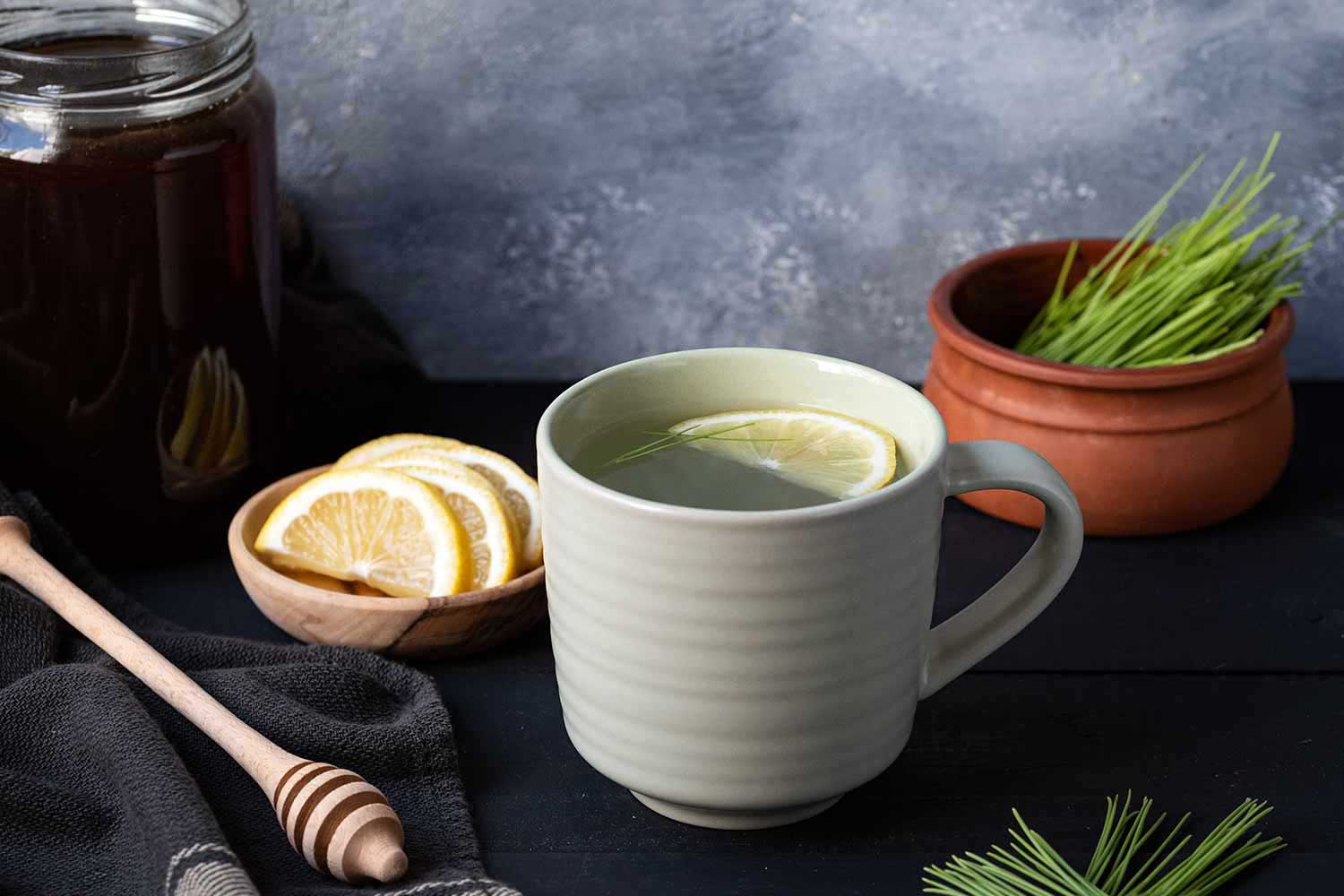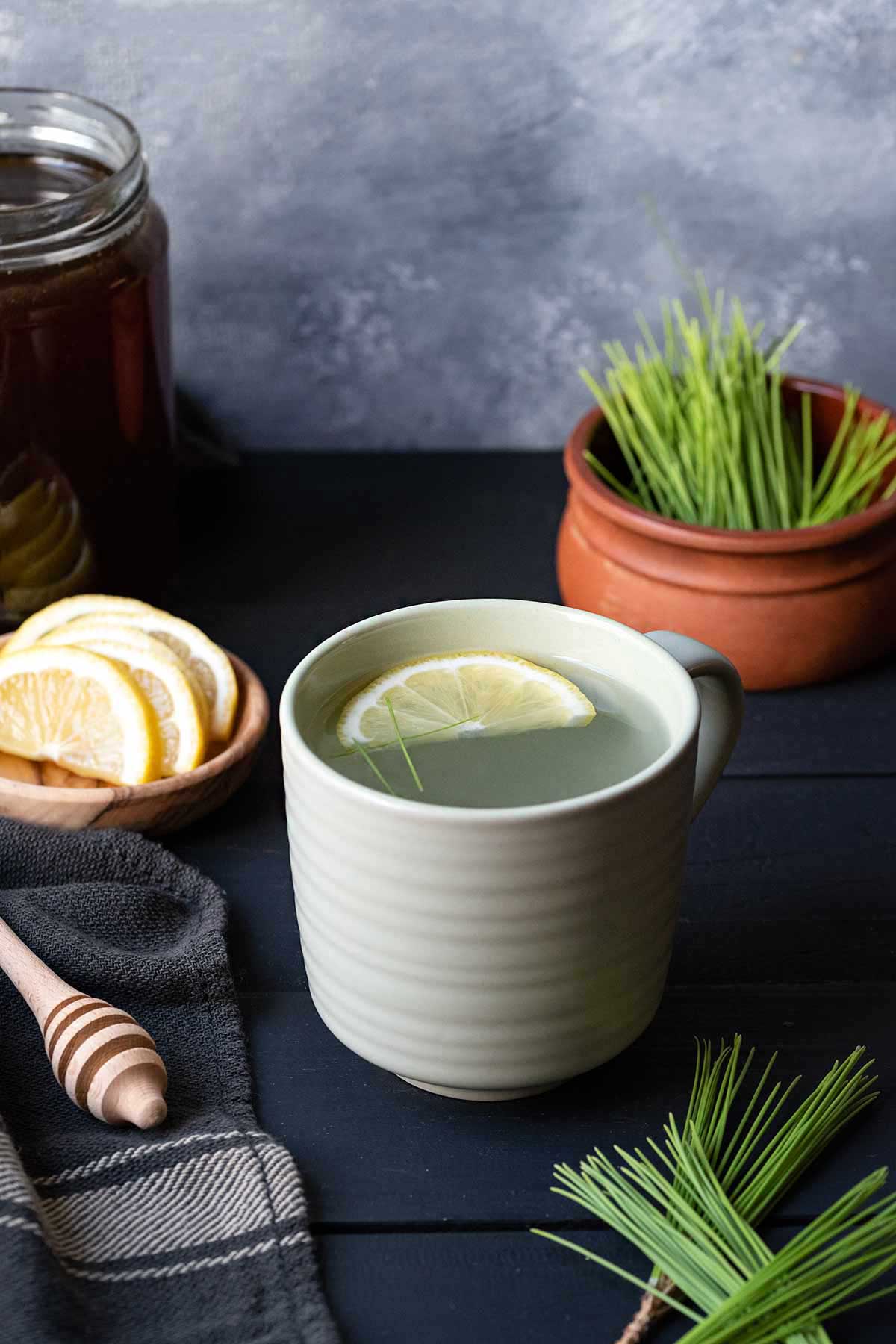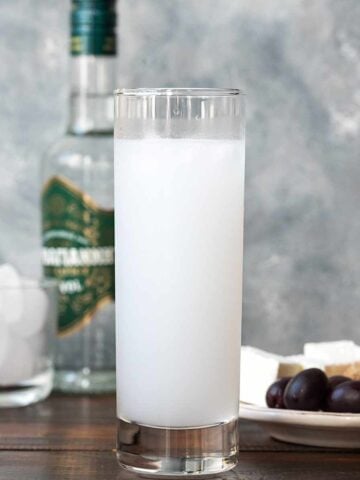Learn the basics for how to make pine needle tea, what are the health benefits, which types of pine to choose, which to avoid and more.

Jump to:
What is pine needle tea?
It is a type of herbal tea made from the needles of pine trees.
Pine needle tea is a traditional beverage that has been consumed for centuries in various cultures around the world.
The tea is typically made by steeping fresh or dried pine needles in hot water (just as you'd do with any other herbal tea), a procedure which extracts the flavor and the beneficial compounds present in the needles.
The days when I'm feeling down and need a small boost, a cup of pine needle tea and a slice of whole wheat bread with tahini spread will do the job. Other times I'll have a Greek coffee and 1-2 healthy chocolate truffle energy balls.
To make pine needle tea, you can use pine needles from various pine tree species.
The most important thing is to ensure that they come from non-toxic pine trees, because some species can be harmful to humans when consumed. The most commonly used species of pine tree are Eastern white pine (Pinus strobus) and Scotch pine (Pinus sylvestris).
You can read more about the suitable species towards the end of this post.
How to forage pine needles
1. Identify the type of pine tree and make sure it's edible. When foraging and consuming wild plants, the most important thing is to exercise caution and proper identification.
If you are interested in using pine needles in culinary preparations, it's always wise to consult reliable foraging guides or seek guidance from local experts who have knowledge of your specific region and its edible flora. Also you have to be sure that they're free of pesticides and any other chemicals.
2. Forage the pine needles. Cut off the green pine needles straight from the branch of the tree and avoid any brown ones or the ones that seem unhealthy. Also, avoid the ones who have fallen to the ground.
If you have access, choose the lighter green needles at the end of the branch, because they're younger and have more nutrients (you'll notice them especially during Spring). If you're interested in more vitamin C, choose the older, darker in color needles.
3. Discard the brown covering that holds the needle cluster together and throw away any needles that look bad. Rinse them thoroughly under running water and remove any dirt. Pat dry with a clean kitchen towel.
4. Dry the needles for later use or chop them into smaller pieces and use them fresh to make your tea.

Ingredients
- Dried or fresh pine needles
- Boiling water
- Honey or sweetener to taste (optional)
- Lemon slice (optional)
Instructions
Chop the pine needles to smaller pieces to enhance flavor extraction and bring the water to a boil.

Place chopped needles in a teapot or cup and pour over the freshly boiled water.

Cover and let them steep for about 10 minutes in order to release their flavor and oils. Then, strain the tea using a tea strainer or a mesh sieve.
The tea is almost colorless, with a light yellow-green tint.

Optionally, add a squeeze of lemon juice or sweetener to taste.
Instruction notes:
To brew a stronger tea, increase the quantity of pine needles or extend the steeping time. Alternatively, simmer the water with the needles in a pot for 10-15 minutes. Experiment with different pine species to discover your preferred flavors.
Storage
Pine needle tea, once cold, can be stored in the fridge. For the best taste and quality, you should drink it within the first day or two after brewing.
Store it in an airtight sealed container (a glass jar with a lid is perfect for this) to preserve its flavor and protect it from oxidation.
Variations
Are you wondering what can you add to pine needle tea?
To add more flavor and boost the health benefits of your herbal tea, try adding extra herbs such as sage, chamomile, mint, thyme or juniper berries (from common juniper).
Health benefits
Are you wondering what is pine needle tea good for?
Pine needle tea is known for its potential health benefits. Pine needles contain vitamin C, vitamin A, antioxidants, and other beneficial compounds.
More specifically some of the most important pine needle tea benefits are:
Immune system support:
Being rich in Vitamin C, pine needle tea can support the immune system, especially during colder months, and help the body to fight illness and infections.
Combat of oxidative stress:
The tea's natural antioxidants, such as shikimic acid and ascorbic acid, may combat oxidative stress.
Respiratory benefits:
It is believed to provide respiratory relief, soothe sore throats, alleviate chest congestion and help with both dry and wet coughs.
Anti-inflammatory properties:
Pine needle essential oils contain compounds like alpha-pinene and beta-pinene, which have been studied for their anti-inflammatory effects. They also contain phenolic compounds, including catechins, which have been associated with anti-inflammatory effects.
The tea's rich content of essential oils, vitamins, and antioxidants makes it a great addition to one's wellness regimen.
However, it's important to note that scientific research on the specific health benefits of pine needle tea is limited, and it's always a good idea to consult with a healthcare professional before adding any new herbal tea to your diet.
Pregnancy and pine needle tea:
While pine needle tea is generally safe for consumption, it's recommended that pregnant women consult with their healthcare provider before incorporating it into their diet. Some sources advise caution due to the presence of certain compounds which can cause abortion.
Fun Fact:
Did you know that pine needle tea played a significant role in history?
During Jacques Cartier's exploration of North America in the 16th century, indigenous people introduced him to pine needle tea to combat scurvy. This discovery led to the understanding of the tea's high vitamin C content, which helped prevent the disease.

Pine Tree Species
Pine needle tea can be made from different species of pine, each offering its unique flavors and characteristics.
Here are a few pine tree species whose needles are known to be safe for making tea:
- Eastern White Pine (Pinus strobus).
- Western White Pine (Pinus monticola).
- Scots Pine (Pinus sylvestris).
- Loblolly pine (Pinus taeda).
- Whitebark Pine (Pinus albicaulis).
- Jack Pine (Pinus banksiana).
- Maritime Pine (Pinus pinaster).
- Monterey Pine (Pinus radiata).
- Swiss Stone Pine (Pinus cembra).
- Shore Pine (Pinus contorta var. contorta), also known as Beach Pine, Lodgepole pine
- Korean Pine (Pinus koraiensis).
- Virginia Pine (Pinus virginiana).
- Pinus pinea, commonly known as the Stone Pine or Mediterranean Pine.
Note: Pine needles from pine trees in the family Pinaceae are generally safe for consumption
What to avoid (inedible pine trees)
Caution: these are just some (and not all) of the pine trees which can be toxic to humans. It's important to be aware of these species to avoid any potential health risks.
Here are a few examples of pine trees whose needles are considered to be toxic or have adverse effects:
- Norfolk Island Pine (Araucaria heterophylla).
- Australian Pine (Casuarina equisetifolia).
- Common Yew Trees (taxus baccata): Yew trees have flat needles, which are highly toxic if ingested. It's important to note that yew trees are not true pines but are commonly mistaken for them due to their needle-like foliage.
- Ponderosa Pine (Pinus ponderosa) also known as Blackjack, Western Yellow, Yellow and Bull Pine.
- Poison Hemlock (Conium maculatum): Although not a pine tree, it's worth mentioning that Poison Hemlock, a highly toxic plant, has leaves that resemble pine needles. It is crucial to avoid consuming any part of this plant as it can be fatal.
Fresh or dried pine needles?
Pine needle tea can be made from both fresh or dried pine needles, depending on personal preference and availability.
Fresh Pine Needles: Using fresh pine needles can yield a vibrant and aromatic tea. When using fresh needles, it's best to harvest young, tender needles, typically in the spring or early summer.
Dried Pine Needles: Drying pine needles can concentrate their flavor and make them more convenient to store and use.
To dry pine needles, clean them and rinse them well under running water, then pat-dry with kitchen towels.
Spread them out in a single layer in a well-ventilated area and let them to air dry until they become brittle and snap easily.
Once dried, store them in an airtight container until ready to use.
📖 Recipe

Pine needle tea (recipe, health benefits and more)
Equipment
- 1 sieve
Ingredients
- 2 tablespoons dried or fresh pine needles
- 1 cup of boiling water
- Honey or sweetener to taste, optional
- 1 Lemon slice, optional
Instructions
- Chop the pine needles to smaller pieces to enhance flavor extraction.
- Place them in a teapot or cup and pour over the freshly boiled water.
- Cover and let them steep for 10 minutes or more.Then, Strain the tea using a tea strainer or a mesh sieve.
- Optionally, add a squeeze of lemon juice or sweetener to taste.
Notes
Nutrition
Similar recipes you'll love:
FAQ
The taste of pine needle tea can vary depending on the species of pine tree used, the freshness of the needles, and the brewing method.
Most people describe it as having a refreshing, slightly resinous taste with hints of citrus and earthiness. Others often describe it as being subtly sweet, slightly tangy, and herbal.
Drinking pine needle tea in moderation is generally considered safe for most people. However, it's important to exercise caution and be aware of a few considerations:
Some individuals may have allergies or sensitivities to pine trees or their components. If you are prone to allergies or have known sensitivities, it's advisable to start with a small amount of tea and observe any adverse reactions. Discontinue use if you experience any discomfort or allergic symptoms.
Chemical Contamination: It's important to avoid using pine needles from trees that may have been exposed to pesticides, herbicides, or other chemical pollutants. Harvest needles from areas away from sources of contamination, such as roadsides or industrial areas.
Pregnancy and Medical Conditions: If you are pregnant, breastfeeding, or have any pre-existing medical conditions, it's best to consult with a healthcare professional before regularly consuming pine needle tea. They can provide personalized advice based on your specific circumstances.
Some types of pine needle tea may have mild diuretic properties, meaning they can increase urine production. This may be helpful for promoting kidney function and flushing out waste products.








Leave a Reply